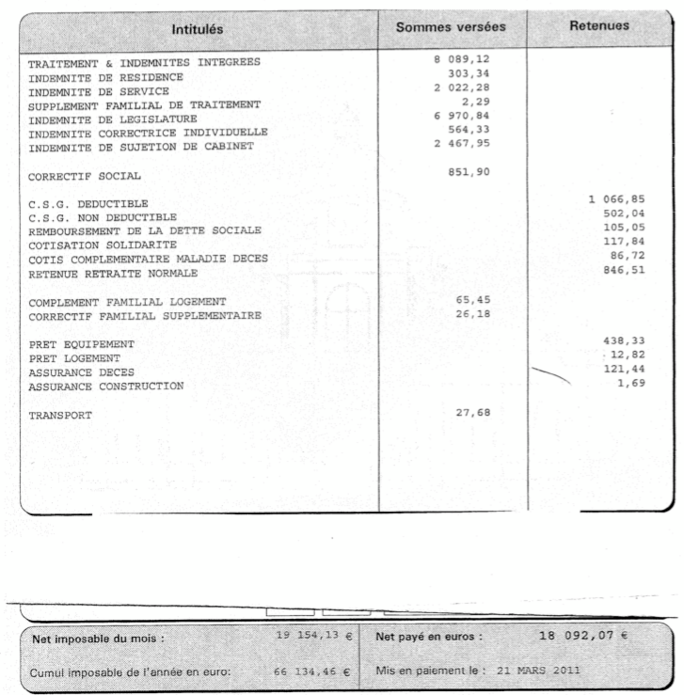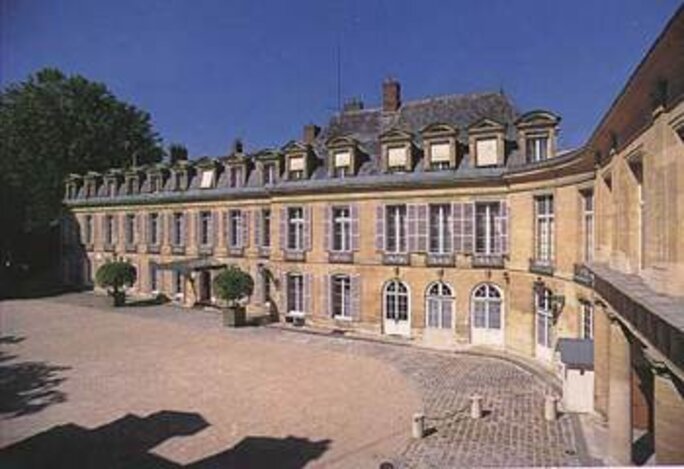French Senate president Gérard Larcher entered office on a high-profile campaign to cut spending and impose budgetary discipline within the French parliament's notoriously lavish upper house. Mediapart this month obtained access to the payroll of the president's private staff, and it reveals anything but austerity. The average monthly salary is 8,500 euros while his principal private secretary earns more than 19,000 euros, just a few hundred euros short of the pay of French Prime Minister François Fillon. Mathilde Mathieu and Michaël Hajdenberg report.
-------------------------
Housed in the luxurious, sprawling buildings and grounds of the 17th-century Luxembourg Palace, in the capital's Latin Quarter, the French Senate is the upper house of French parliament1. Its 343 senators are assisted by more than 1,000 civil servants and personal aides, and the institution has a total staff of 2,000.

In October 2008, Gérard Larcher, a senator with the ruling conservative right UMP party, was elected president of the Senate, replacing Christian Poncelet. He rapidly announced a series of reforms during his three-year mandate to reduce the lavish spending and grace-and-favour regime of the senate, which had shocked public opinion after a series of media revelations.
These ranged from the right for life for senators to travel first class and for free on the country's railway system, to the right for life of the institution's president to one of the Senate's dozens of rent-free apartments - something that Poncelet astonishingly at first denied before being forced to agree to leave it, a 200 square-metre penthouse in the plush 6th arrondissement, by 2014.

Larcher's reforms included an immediate reduction of 4.3 million euros in in annual spending, the transformation into offices of two thirds of its 54 private apartments, a reduction in bonuses and restrictions on the use of chauffeur-driven cars. "At a difficult moment for the French population, I understand their demands," he said in a press conference shortly after his election. "It seemed to us essential that the republic's institutions react, not in a populist manner but simply by making a certain number of efforts [...] A number of things that have been said or read are no doubt due to the fact that we don't communicate enough about a certain number of subjects, which is why I have made transparency a requirement."
But an investigation this month by Mediapart has discovered that the yearly cost of Larcher's cabinet - the offices and staff which work directly for the administration of his presidency - had risen by 26% in 2010 on that of Poncelet in 2007. In 2010, the payroll for Larcher's personnel totaled 2, 826, 610 euros. Interviewed by Mediapart, Larcher, 61, confirmed the 26% increase and defended the hike as one destined "less on petits fours [pastries], more on grey matter".
Below: monthly pay details for Senate president's principal private secretary and one of his consultants (click screen to enlarge).

Enlargement : Illustration 3


-------------------------
1: The French parliament is made up of the Senate (upper house) and the National Assemlbly (lower house). The latter is where Members of Parliament, directly elected by the public, sit. Senators are elected, region by region, by local mayors and councilors. Both houses are involved in lawmaking, although the National Assembly is the prioncipal arena of national political debate and policy making. For more detail about the Senate, click here for the institution's own website and here for the Wikipedia overview.
Mediapart consulted the payroll for Larcher's personnel for March 2011. The following monthly earnings show the amount paid after social security (welfare) deductions, but before tax; Larcher's principal private secretary (Editor's note: directeur de cabinet) earned 19,154 euros, (amounting to 18, 092 euros and 97 centimes before income tax). His press attaché earned 10,880 euros, while the consultant for social affairs, business and professional training received 8, 788 euros. Another ‘special' consultant was paid 8,029 euros, which was on top of that person's monthly 11, 715-euro pension as a retired senate employee. Another consultant for economic, agricultural and rural affairs and sustainable development took home 7,941 euros.
Other examples included the president's senior secretary, paid 5,304 euros per month, and a person employed 38 hours per month as his speechwriter, paid 1,052 euros.
As a point of comparison, the salary for a French senator is, before tax, 5,400 euros per month, while a French government minister earns 12,000 euros per month and the French prime minister receives 19,800 euros per month.

According to the senate's website, 19 staff - excluding secretaries - are directly employed by its president. In fact, this omits the names of two special consultants, which Larcher's principal private secretary Jean-Louis Schroedt-Girard said was because "only full-time staff are listed". The explanation is questionable, given that it does feature André Klein, a ‘technical' consultant who works just 60 hours per month. But even taking this official figure, it totals five more employees than those working for the offices of the president of the lower house of French parliament, the National Assembly.
Interviewed by Mediapart in his Senate offices this month, Larcher said he was the first president of the institution to have ordered an audit of his office's accounts, carried out by the Deloitte and Scacchi & associés agencies in 2009 (although only a partial account of the results were published). Larcher also insisted that "the global spending of the [senate] presidency has fallen by 8% since 2007". He cited the scrapping of two chauffeur's jobs, the fact that his consultants now pay their meal-trays themselves (each worth 6.36 euros), and that his principal private secretary has no free official accommodation.
Outside of his administrative staff, the Senate president's office also employs 52 other personnel, who represented a total payroll in 2010 of 4,367,095 euros. These include a head chef on a fixed-term contract who earned, before tax deductions, 5,994 euros per month, and a junior chef on 3,969 euros. The president's chauffeur earned 2,892 euros and a ‘dish and vegetable washer' was on a monthly 1, 894 euros.

In 2010, the entire spending of the president's office totalled 7,840,000 euros, of which 311,976 euros went on entertainment (less than in 2009), and 281,939 euros were spent on travel and accommodation costs (a slight increase on 2009).
Included among Larcher's reforms of the senate are a reduction in bonuses, standardisation of working hours, the introduction of job mobility among senior staff, and a reduction in the number of administration departments from 21 to 14.
"Among those who most opposed the reform, a certain number earn more than the technical advisors in my offices," said Larcher. "For those in my offices on fixed-term contracts, when they come to an end they come to an end, while the Senate's civil servants are guaranteed employment and [a] particular pension scheme. At the end of their career, a secretary working in the Senate earns 7,200 euros [per month], an assistant administrator 8,800 euros [per month]. An administrator, and I'm not even talking about a director, is [on] 13,420 euros."
As for the 40% hike since 2007 in the salary burden for fixed-term contract workers, the Senate president argued: "The level is not the same, I needed an office [of staff] at the right level. We recruited a regional prefect, people who work in private enterprise, in ministerial cabinets, who had experience, and we met the rate."
-------------------------


